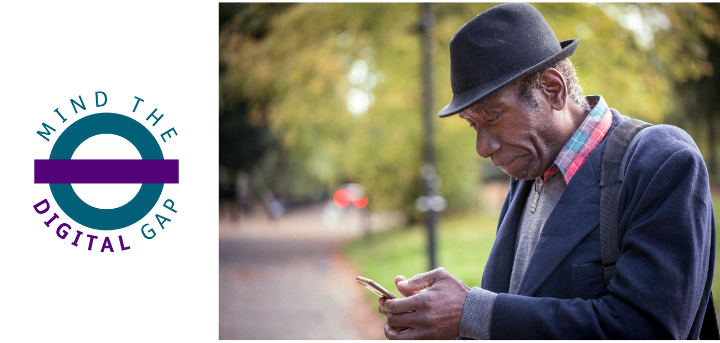Data or dinner?

Age UK London are campaigning for urgent action to address the profound challenges of digital exclusion that affects thousands of older Londoners. The gap between those with and without access to the internet is widening and the capital is at risk of witnessing a growing digitally excluded underclass.
Data Poverty
Data poverty is an inequalities issue which needs to be addressed. Older Londoners who cannot afford to be online are excluded not only from keeping connected and informed but also from accessing vital public services as well as missing out on the many financial savings that people can only get online.
London has the highest pensioner poverty in the country so cost is a greater factor than elsewhere when it comes to data poverty (as well as the cost of devices). Affordability is one of the main reasons why many older Londoners are not online. The English Longitudinal Study on Ageing (ELSA) data shows there is demand among older people to get online, with 23% of Londoners aged 65 – 74 and 25% of Londoners aged 75+ wanting to use the internet more.
London is one of the richest cities in the world and no older Londoner should be facing insecurity and impossible decisions about money eg heating or eating – data or dinner. London is also more diverse than other parts of the country and we know that older people from Black, Asian and minority ethnic backgrounds are more likely to live on a low income so this barrier affects them more.
All aspects of our lives touched by the internet
Internet use is affecting almost every aspect of both our public and private lives. If older Londoners cannot afford to be online then they will be increasingly left behind and excluded from society. There has been movements of all kinds of services moving online during the pandemic. We have seen an increase in high street banks closing their buildings and asking their customers to use their online services. Older adults are still being asked to attend virtual medical appointments rather than face-to-face ones.
Although restrictions have eased, many services have remained virtual and the older Londoners who are not online are finding everything more inaccessible. Broadband has become crucial for participating in modern life.The benefits of being online for older Londoners, especially those that are house-bound, are that it can help them connect with the world outside their front door and give them independence. But for too many older people, the cost of getting online is a barrier to this independence.
Affordability
Many internet providers focus on and prioritise the speed of their connectivity rather than the cost. Older Londoners who cite affordability as a reason for not going online want simplicity and value and a clear understanding of cost. It is not always possible to have a broadband-only service and some older Londoners are faced with a huge variation of packages and bundles that include broadband as well as TV and telephone. Expensive high-speed broadband may not be appropriate and older Londoners, especially those on Pension Credit, should be able to access a free or very low cost broadband only offer.
Social tariffs – have older people been forgotten?
We welcome the internet providers who have set up “social tariffs” for those on low incomes. Sadly, the eligibility for some of the social tariffs available actually exclude older Londoners: those receiving Universal Credit are eligible but not those who receive Pension Credit. When a person on Universal Credit reaches state pension age they are not entitled to Universal Credit anymore and then they must apply and make a claim for Pension Credit instead.
We hope to see internet providers change their eligibility criteria for social tariffs so that older people on Pension Credit can benefit from low-cost internet services.
